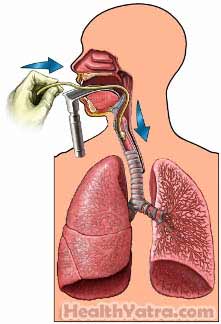تعريف
General anesthesia puts the entire body to sleep by giving medicine. It is often used during emergency surgery. It is also commonly used if a procedure would make you uncomfortable if you were awake.
Doctors trained in anesthesia (anesthesiologists) carefully balance the amount of anesthesia medicines given by closely monitoring the body’s functions. Medicines are used to:
- Prevent pain
- Relax the muscles
- Regulate body functions
أسباب هذا الإجراء
This is used so that surgery can be done without you:
- Being aware of it
- Feeling any pain
المضاعفات المحتملة
Every precaution is used to prevent complications. Often, medicines are given in advance to prevent certain problems, such as nausea and vomiting. Even so, complications may occur and include:
- استفراغ و غثيان
- Allergic reaction to anesthetic used
- Nerve damage or skin breakdown from positioning on the operating table
- Sore throat or damage to throat, teeth, or vocal cords
- While rare, there is a small risk of the following complications, especially among the elderly or those with medical problems:
- Lung infections
- سكتة دماغية
- نوبة قلبية
- Anesthesia awareness—a rare complication where the patient becomes aware during the surgery
تشمل العوامل التي قد تزيد من خطر حدوث مضاعفات ما يلي:
- Medical conditions—heart, respiratory, kidney conditions, and diabetes
- Certain medicines—especially those that increase bleeding (eg, aspirin)
- التدخين
- Alcohol use—may alter the way the liver handles anesthesia
- Time of last food intake—a full stomach may cause food to enter the lungs
- Adverse reactions to anesthesia in the past or family history of adverse reactions
- Food or drug allergies
تأكد من مناقشة هذه المخاطر مع طبيبك قبل الإجراء.
ما يمكن توقعه
قبل الإجراء
Unless you are having emergency surgery, you will meet with an anesthesiologist before surgery and will be asked about:
- Your health history and your family’s health history—Tell your doctor if you have had anesthesia before and your reaction to it. Tell your doctor about your family’s history with anesthesia.
- Medicines that you take, including herbs and supplements—These can have an effect on how the anesthesia works.
قبل الإجراء:
- Your height and weight will be taken.
- You will need to fast the night before surgery.
- You may need to take certain medicines in the morning before surgery.
وصف الإجراء
General anesthesia is broken down into three phases:
- Induction phase—Medicines will be given that result in the loss of consciousness. These will be given through an IV or through gas into the lungs. A breathing tube will be placed down your windpipe. This will be attached to a machine that helps you continue to breathe normally.
- Middle or maintenance phase—Medicines will be given based on your responses. These may keep you asleep or regulate your body functions.
- Recovery or emergence phase—This will slowly reverse the anesthesia. The medicines given will allow you to wake up. When you are starting to awaken and are breathing on your own, the breathing tube will be removed.

مباشرة بعد الإجراء
As you wake up, you will be closely monitored. You will be given pain medicine if you need it.
كم من الوقت سيستغرق ؟
This procedure takes as long as needed, depending on the surgery.
كم هو مؤلم ؟
General anesthesia numbs all pain. Since you are asleep, your brain will not sense any pain signals.
متوسط الإقامة في المستشفى
How long you spend in the hospital depends on:
- Type of surgery
- Your reaction to the surgery and anesthesia
رعاية ما بعد العملية
Once you have recovered from anesthesia, you will be sent to a hospital room or home. For the first 24 hours or longer, avoid doing activities that require your attention, such as driving. Be sure to follow your doctor’s instructions.
استدعاء الطبيب
بعد مغادرة المستشفى ، اتصل بطبيبك في حالة حدوث أي مما يلي:
- علامات الإصابة, بما في ذلك حمى وقشعريرة
- Nausea and/or vomiting that you cannot control with the medicines you were given after surgery, or which last for more than two days after leaving the hospital
- السعال، ضيق التنفس، أو ألم في الصدر
- Dizziness, faintness
في حالة الطوارئ ، اتصل على المساعدة الطبية على الفور.
